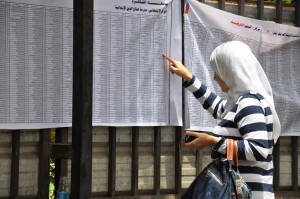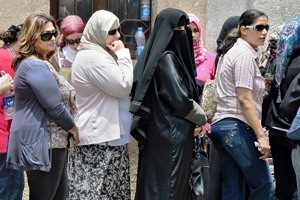Egyptian women cast votes and rally for their country’s future
Date:
“Even if I am not going to live for very much longer, I am voting for the future of my grandchildren. So states one elderly lady as she waits in front of a polling station in Cairo, voicing the hope and resolve of a nation going to the polls.
Over 50 million voters are eligible for Egypt's 2012 presidential elections, the first since the country's inspiring revolution, and of them, 23 million are women. Recent UN Women's analysis has shown that 90.3 per cent of women surveyed are willing to participate in the upcoming presidential election.
Having stood shoulder-to-shoulder with the men in Tahrir Square, many women flocking to the polling stations are more aware than ever of their critical role in their country's future, and the issues at stake. Our dreams are with the future president, said one woman voter. “It will not be an easy presidential period but we are not passive anymore. We are going to raise our voices, disagree and comment for the sake of a better quality of life. One woman, a new mother, told UN Women,“I have to vote to see Egypt in a better state.

Since the January 2011 mass uprising that toppled the former Egyptian president, Hosni Mubarak, many women feel that they have been pushed back into the shadows and marginalized. This relates in particular to their involvement in the public and political affairs of the country. There are currently only eleven women in Egypt's lower house of parliament after a previous gender quota that reserved 64 seats was scrapped.
Leading up to the presidential elections, UN Women has worked to support the priorities of Egyptian women in the country's future. Many of these have been identified through workshops and discussions with the women's groups, which have aimed to empower potential women candidates for local councils and legislative body elections, and to help set the tone for election-period advocacy at all levels.
UN Women recently produced a short documentary in partnership with Egypt's National Council for Women (NCW), which has aired on several television Egyptian channels. In What Egyptian Women Want from the Next President, many express a fear of significant setbacks, despite the momentum of the Arab spring. High on their list of concerns is the fate of personal status laws in Egypt, which govern mostly family related issues, and the revival of support for the tradition of Female Genital Mutilation.

Agreed recommendations have emerged from the women's forums held over the last year. These include the need for Egypt's new president to cement his commitment to women's rights by honouring international agreements, such as the UN Woman's Convention (CEDAW), ratified by Egypt. It also included the need for a minimum of 30 per cent representation of women at all levels, which would open up their paths to key decision-making positions, such as political posts of Vice-President and Prime minister. The recommendations also advocate for gender equality in job opportunities and education, the equal inclusion of women in legislative bodies and the Constituent Assembly, and better high-level focus on the priorities of impoverished women.
Meanwhile, by analyzing surveys and public opinion polls through a gender lens with the Egyptian Center for Public Opinion Research, UN Women is connecting key findings on attitudes and practices related to gender, with decision-makers.
As voters pin their hopes on the weeks to come, the country's women will continue to unite, to stake their place in what they hope will be a democratic and just regime for all Egyptians.